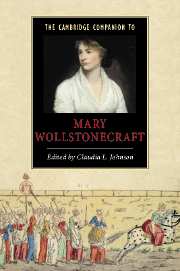Book contents
- Frontmatter
- 1 Introduction
- 2 Mary Wollstonecraft's letters
- 3 Mary Wollstonecraft on education
- 4 Mary Wollstonecraft's Vindications and their political tradition
- 5 Mary Wollstonecraft's French Revolution
- 6 Mary Wollstonecraft's literary reviews
- 7 The religious foundations of Mary Wollstonecraft's feminism
- 8 Mary Wollstonecraft and the literature of advice and instruction
- 9 Mary Wollstonecraft's A Vindication of the Rights of Woman and the women writers of her day
- 10 Mary Wollstonecraft and the poets
- 11 Mary Wollstonecraft's novels
- 12 Letters Written During a Short Residence in Sweden, Norway, and Denmark: traveling with Mary Wollstonecraft
- 13 Mary Wollstonecraft and the sexuality of genius
- 14 Mary Wollstonecraft's reception and legacies
- Select bibliography
- Index
11 - Mary Wollstonecraft's novels
Published online by Cambridge University Press: 28 May 2006
- Frontmatter
- 1 Introduction
- 2 Mary Wollstonecraft's letters
- 3 Mary Wollstonecraft on education
- 4 Mary Wollstonecraft's Vindications and their political tradition
- 5 Mary Wollstonecraft's French Revolution
- 6 Mary Wollstonecraft's literary reviews
- 7 The religious foundations of Mary Wollstonecraft's feminism
- 8 Mary Wollstonecraft and the literature of advice and instruction
- 9 Mary Wollstonecraft's A Vindication of the Rights of Woman and the women writers of her day
- 10 Mary Wollstonecraft and the poets
- 11 Mary Wollstonecraft's novels
- 12 Letters Written During a Short Residence in Sweden, Norway, and Denmark: traveling with Mary Wollstonecraft
- 13 Mary Wollstonecraft and the sexuality of genius
- 14 Mary Wollstonecraft's reception and legacies
- Select bibliography
- Index
Summary
Beyond the sphere of Wollstonecraft studies, Mary, A Fiction (1788) and The Wrongs of Woman, or Maria (1798) typically receive scant attention. As if her novels had little intrinsic interest, most histories of the novel do not mention Wollstonecraft's contributions to the genre, and until relatively recently Wollstonecraft scholars in a way have seemed to concur, largely ignoring the first and reading the last either as an extension of her biography or as a fictionalization of A Vindication of the Rights of Woman. At first glance, some skepticism about Wollstonecraft's contributions to the English novel seems only too reasonable. Although she became a woman of letters – “moralist” would probably have been the eighteenth-century term for her – Wollstonecraft's career did not develop around a single genre. All of her works are of a piece in their very diversity, blending overlapping discourses of education, political commentary, travel literature, autobiography, moral philosophy, and fiction by turns, and while this makes for challenging and often bracing reading, it is also probably a little dizzying to audiences whose generic expectations are more straightforward, who expect novels to execute a well-managed plot or to unfold incrementally developing character. Moreover, like most women writers of the time, Wollstonecraft had little in the way of formal education and is not a remarkably deft writer, lacking the ease and fluency of novelists like Ann Radcliffe, Charlotte Smith, the dramatic flair of Elizabeth Inchbald, let alone the comprehensive mastery of narration, dialogue, and pacing of someone like Jane Austen. She mostly wrote topically and in haste, rarely polishing what she had done, and she did not even finish such major works as Rights of Woman, Historical and Moral View of the French Revolution, and, of course, Wrongs of Woman.
- Type
- Chapter
- Information
- The Cambridge Companion to Mary Wollstonecraft , pp. 189 - 208Publisher: Cambridge University PressPrint publication year: 2002
- 1
- Cited by



